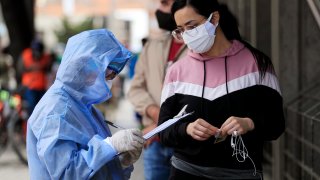
The World Health Organization said Monday there may never be a “silver bullet” for the coronavirus even as scientists and drugmakers across the globe race to find a safe and effective vaccine.
Scientists have made progress in identifying treatments that can help people with the most severe forms of Covid-19, and a number of vaccines are in late-stage trials, WHO Director-General Tedros Adhanom Ghebreyesus said during a press conference from the agency’s Geneva headquarters. “However, there is no silver bullet at the moment and there might never be.”
There are no-FDA approved drugs for the coronavirus, which has infected more than 18 million people worldwide and killed at least 689,625, according to data compiled by Johns Hopkins University.
In May, the FDA granted antiviral drug remdesivir an emergency use authorization, allowing hospitals and doctors to use the drug on patients hospitalized with the disease even though the drug has not been formally approved by the agency. The FDA has also said it is looking at dexamethasone, a steroid already authorized in the U.K. for the treatment of Covid-19.
However, public health officials say there is no returning to “normal” until there’s a vaccine. There are more than 150 vaccines under development worldwide, according to the WHO. At least 25 of them are already in clinical trials. On Thursday, senior administration officials at the Department of Health and Human Services said drug companies Pfizer and Moderna, which both began a phase three trial for their leading vaccine candidates last week, have already vaccinated “several hundred people” within the first few days.
For now, world leaders can stop new outbreaks by practicing the “basics” of public health and disease control, Tedros said Monday. “Testing, isolating and treating patients and tracing and quarantining their contacts. Do it all. Inform, empower and listen to communities. Do it all.”
The public can help by practicing social distancing, wearing a mask, cleaning hands regularly and coughing safely away from others, he said.
“The message to people and governments is clear: Do it all,” he said. “And when it’s under control, keep going, keep strengthening the health system, keep improving surveillance, contract tracing and ensure disrupted health services are restarted as quickly as possible.”
WHO reported Friday the largest single-day increase in cases at almost 300,000 new cases in 24 hours.
WHO officials have warned there is no going back to the “old normal” as the coronavirus pandemic accelerates in the United States and poorer, developing countries.
“It’s completely understandable that people want to get on with their lives, but we will not be going back to the old normal,” Tedros said on July 23.
Even though cases are high in the U.S. and other parts of the world, there’s still a chance to bring the virus under control, the agency said.
The WHO recommends that people wear masks as a way to slow the spread of the virus. Scientists say the virus can spread through respiratory droplets that pass when an infected person coughs or sneezes. Studies suggest the masks may serve as a helpful barrier to spreading infection.
The agency also recommends people wash their hands regularly, maintain their distance from others and avoid going to crowded places. If you have a fever, cough and difficulty breathing, seek medical attention, but call by telephone in advance if possible and follow the directions of your local health authority, the WHO said.
This story first appeared on CNBC.com. More from CNBC:

